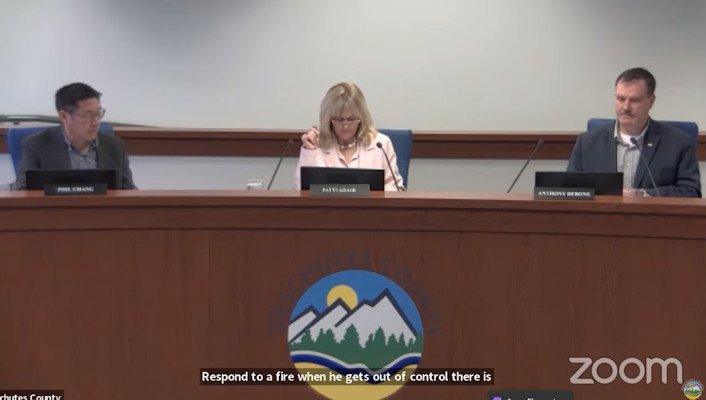Deschutes County Commissioner Phil Chang still wants a business license for short-term rentals, but it’s failing to fly

Staff point to costs, other issues; Tony DeBone opposed, Patti Adair skeptical
BEND, Ore. (KTVZ) – Deschutes County commissioners have been discussing for months the idea of enacting a business license for short-term rentals in the unincorporated county, to better assure land-use, health and safety issues are addressed and help neighbors deal with any conflicts.
But the move still backed by Commissioner Phil Chang hit more rough sledding Wednesday with opposing colleague Tony DeBone, unsure Commissioner Patti Adair -- and with staff warning of the added costs and issues for an already staff-challenged Community Development Department.
Much of the attention in the latest go-round was focused on the concerns raised by CDD Director Peter Gutowsky about the staffing – and funding – it would take to not just create and implement the license, but to deal with the myriad of details, such as questions of staff and complaints from neighbors about renters or property owners who they believe are violating the rules or causing noise, traffic or other trouble.
“I’m not supportive of putting this licensing in place,” DeBone said at the start of Wednesday's discussion, noting there area already other processes in place and ways to deal with the issues, from fire and life safety to septic systems and wildfire risks, without such a license system.
Chang mentioned there were previous discussions about perhaps prohibiting outdoor fire pits at short-term rentals, “where we know people are partying and not always paying attention to dangerous things around them,” for the 800 or so STRs in the unincorporated county that are not in destination resorts, which have their own staff and regulations.
“I’m not proposing that (fire pit ban),” DeBone said.
“I’m proposing that,” Chang replied,
But DeBone said that beyond small warming fires, the size and shape of fires to ban “could be debated,” and that rural fire districts, the sheriff’s office and other partners already deal with such issues when they arise.
But to Chang, that's not enough: “I think we all know how fast a fire can move in the middle of summer, when it’s dry and if there are strong winds.”
But who will do that added enforcing is just one of the possibly sticky details. Then there are the liability issues, if the county verifies that a place complies with the rules, and something goes badly wrong despite that.
The county now issues “certificates of occupancy” for short-term rental spaces that confirm the zoning is proper and other requirements are met, such as the number of bedrooms.
Gutowsky said the time spent on such tasks may well be similar to that for verifying rural accessory dwelling units (ADUs) that the county adopted amendments for in December, after lawmakers agreed to make it a reality.
“All of that takes time and takes resources,” he said, “and it doesn’t necessarily lead to development for a fee-dependent department.” From answering questions to processing and enforcement, it all takes time – and funds. Gutowsky roughly estimated it could cost $500,000 or even $1 million to get up and running.
But Chang argued that could be a positive thing, providing more and more stable revenue to better cover CDD’s existing and future staff needs and those the new business license would create, which he said should not be onerous.
It also would address a familiar complaint he said, showing that the county is “not charging a fee to just make some money, but so we can protect the public health and safety and the peace for these neighborhoods. And this costs money.”
Gutowsky said, “We know that there’s a lot of unpermitted structures that are being used as a dwelling,” and the license could generate a demand for more enforcement so they can’t also be used for short-term rentals.
Chang held his ground: “You can’t point to a problem and say, ‘Don’t mess with it,’ because it’s already a problem … it’s still something that needs to be fixed.”
Adair returned to the point several times that only 800 of the 3,200 short-term rentals in the county are outside of resorts, and many of them are under a management agreement that’s supposed to address those issues.
Gutowsky said hiring two or three more code enforcement officers, adding in training and other aspects, could cost “easily a half-million dollars.”
Chang said the revenues STRs receive in recent make the “small fee” of a business license just another part of the cost of doing business. “I don’t think anyone would say to charge a short-term rental in Sunriver,” for example, with its homeowners association structure and the like, what a rural propert owner would face.
After more discussion, Adair told her colleagues: “I’m not ready to do anything today,” without more study of just how big a problem the issues really are and what's being done now.
A staff member noted that they had denied about 45 certificates of occupancy for short term rentals in just the past couple of months, sending them to CDD for clarification on issues from zoning to structural issues and not renting out the primary dwelling -- things that couldn’t be quickly corrected by the property owner.
Gutowsky said CDD has lost both code enforcement officers and permit techs, and that it can take two years to train someone to enforce county codes to the point they can work on their own.
Adair said she’s talked to residents, many elderly, who want to rent out a room so they can afford to stay in their home. Staff said long-term rentals in someone's home wouldn't fall under the proposed license, only short-term rentals for 30 days or less.
After all that talk, Chang had gotten the message.
“It sounds like we don’t want to do anything today, so let’s move on,” he said.
And they did.
